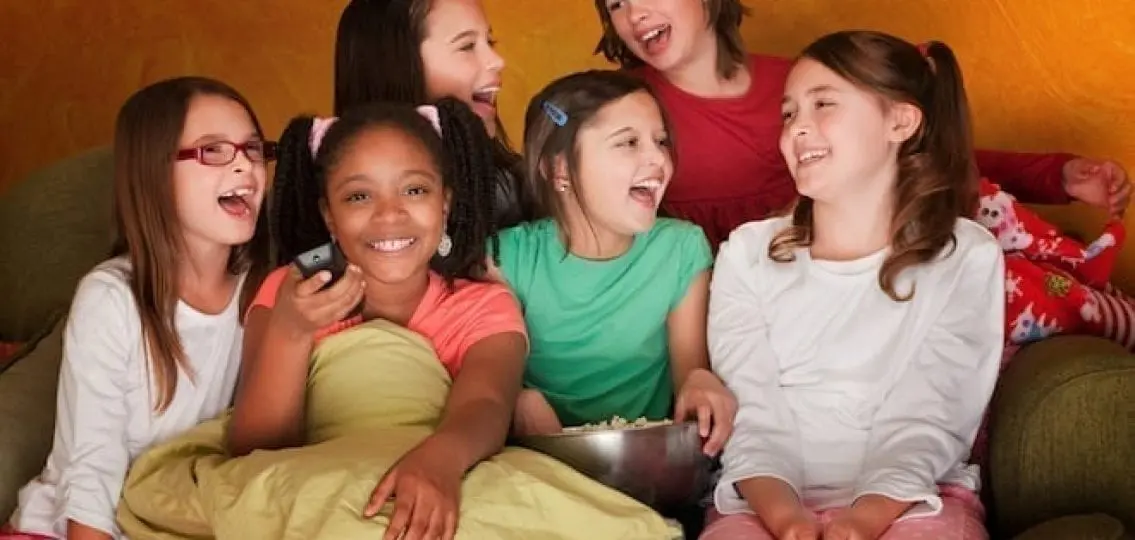It’s nearly the end of the school year, and once the homework load dissipates, most tweens and teens are clamoring for more sleepovers. According to a Harris Poll, Americans say kids are ready at age 11 (10.7 on average) to venture out to a sleepover, but many start even younger.
It seems it’s a necessary rite of passage, but is there a way parents can smartly navigate a sleepover party without losing their cool, and their children’s confidence?
Dr. Deborah Gilboa, known as Ask Dr. G, Founder of askdrg.com and author of How to Be the Parent You Want. Without Being the Parent You Hate! gave us practical advice that parents can immediately implement to ensure a (fairly) worry free experience for both kids and parents.
8 Tips For A Sleepover Party:
1. Ask “What is your plan?”
Dr. G says that some tweens and teens struggle through a bedtime routine or are even bedwetters. She suggests that if you or your child has concerns, approach it as a team, and role play by going through the ‘what ifs’ and possible solutions. So, ask “what if you have a bad dream?” (possible solution: you can leave your cellphone on, so your child can call you). Or “what if you wake up and are wet?” (possible solution: bring a pad and a change of underwear plus a garbage bag).
2. Decide on a “safe word.”
You need a safe word with your child (such as ‘orange’) that can be used in every situation. Remember, kids grab each other’s phones, so it’s best if it’s a word that is innocuous. “Sometimes kids will initiate prank calls to a socially ostracized teen. If your child doesn’t want to do it, or is afraid that the other kid(s) will be mean if they pass, they can text ‘did you find my orange shirt?’” says Dr. G. That’s your cue to call the house and tell them, ‘We have a family emergency and come and get them, no questions asked.’” This way your teen can even argue with you and save face by making you the bad guy.
3. Leave phone at home.
Dr. G. doesn’t recommend giving phones, unless they are tablets for messaging or “dumb phones” that aren’t connected to the Internet.
4. Set clear expectations.
Any time a kid is at someone’s house, they can encounter a situation that gets difficult. So, let them know that they have to check with you if anything happens against your family rules of behavior relating to safety, health or what they can watch or play. If they tell you they want to see a movie you are not familiar with, check the rating on Common Sense Media. Tell them, “You can’t binge candy or drink soda, if I’m not there.” Remind them that before they post or text anything, they should imagine how comfortable they would be if it were printed on a sign with their name on it at school.
5. Be modest.
Say no showering or bathing during a sleepover and encourage them to change into their jammies in the bathroom. If questioned, they can say “sorry that’s what we do at home.” Reinforce that no one should be touching their body (no adult back rubs, or tickling games).
6. Encourage a “SleepUnder” instead.
If you know that your kid stays up late, gets cranky and eats junk food at sleepovers, you can make an excuse such as, “we have an early soccer game, but can stay till 10:00 PM.” This way everyone sleeps in their own bed.
7. Use good manners.
Remind them of their manners before they go. They should never open a closed bathroom or bedroom door without knocking. And if someone is making them breakfast or lunch, tell them to pop into the kitchen and ask “is there anything I can do to help?” And thank them afterwards. It’s a great way to get invited back.
8. Ensure your child’s safety.
Parents may also have a few questions before dropping their kids off for a sleepover. Pattie Fitzgerald, the founder of safelyeverafter.com has key questions to ask parents to ensure your child’s safety.
- Will you be staying in your house the entire time?
- Will you be entertaining, or is any other sibling having a sleepover, too?
- Will this be a coed sleepover?
- Do neighbors drop by, or is anyone else also staying in the home?
- Where are the kids are sleeping?
- Is TV and Internet use monitored?
- Do you have guns? (Dr. G cautions that many military families are gun owners, so ask how the guns are secured). The best answer, Dr. G says is that “they are unloaded, trigger locked, separate from the ammunition, and my kids don’t know where they are.”
The bottom line is that sleepovers are great practice for both kids to be away from their parents, and for mom and dad to be away from our kids. It’s their first baby steps toward adulthood, and as with any milestone, you need to be there to hold their hands. But eventually, you’ll let go and both of you will do just fine.




